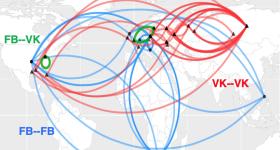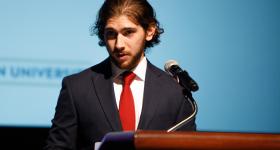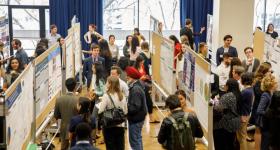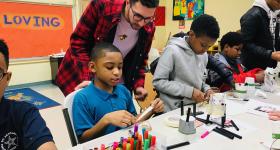Novel Mapping Model Tracks How Hate Spreads and Adapts Online
A team of GW researchers led by Neil Johnson is studying hate on social media. The latest findings outline the challenges to dismantling online hate groups worldwide.


In the Physics Department, students gain hands-on research experience with department faculty, innovative equipment and scientists from some of the world's top institutions. For more than a century, the department has spearheaded important discoveries in our labs and fostered generations of researchers, systems engineers, environmental scientists and biomedical engineers. Outside the department, our faculty hold leadership roles with partner institutes around the world, offering students unparalleled research and employment opportunities.
With lab groups across many interest areas, undergraduate and graduate students can build their research experience and present, publish and win awards for their work. Research is ongoing in experimental and theoretical nuclear physics, experimental and theoretical biophysics, and high-energy astrophysics.
“[The university] combines the academic environment and also the research environment because GW is located in a hub of educational institutions and research centers. … The people that exist at and near the university are such fantastic scientists and personalities.”
Chryssa Kouveliotou
Professor of Astrophysics


The Physics Department operates out of historic Corcoran Hall and the state-of-the-art Science and Engineering Hall (SEH). Labs are outfitted with cutting-edge equipment. The department also partners with researchers from other sciences at SEH, and faculty collaborate with many of the country's top research institutions located in the Washington, D.C., area.
Completed in the basement of Corcoran Hall in September 2024, the cluster is envisioned as infrastructure to support the teaching and research mission of the Physics Department.


Novel Mapping Model Tracks How Hate Spreads and Adapts Online
A team of GW researchers led by Neil Johnson is studying hate on social media. The latest findings outline the challenges to dismantling online hate groups worldwide.

Student Project Leads to International Collaborations
Jack Hirschman was awarded a GW Distinguished Scholar award for his progress on field programmable gate arrays.

Student Innovation Shines at Research Days 2019
Eric Boulter, a junior majoring in astrophysics and music, is using virtual reality technology to bring the solar system to life. Wearing a headset, users can stand among the stars and study how...

Not Just Another Science Class
Members of the GW chapter of the Society of Physics Students share their passion for learning in science, technology, engineering and mathematics (STEM) workshops with local children.
